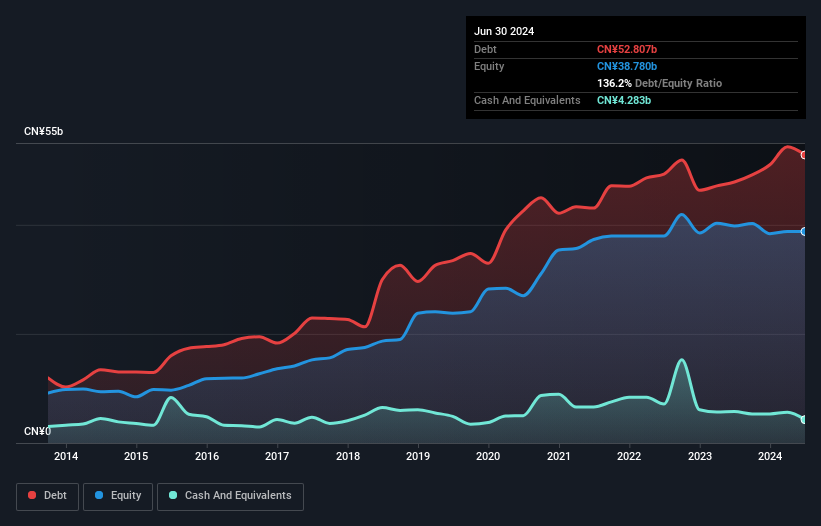- China
- /
- Water Utilities
- /
- SHSE:600008
Does Beijing Capital Eco-Environment Protection Group (SHSE:600008) Have A Healthy Balance Sheet?

Howard Marks put it nicely when he said that, rather than worrying about share price volatility, 'The possibility of permanent loss is the risk I worry about... and every practical investor I know worries about.' So it seems the smart money knows that debt - which is usually involved in bankruptcies - is a very important factor, when you assess how risky a company is. We note that Beijing Capital Eco-Environment Protection Group Co., Ltd. (SHSE:600008) does have debt on its balance sheet. But is this debt a concern to shareholders?
When Is Debt Dangerous?
Debt assists a business until the business has trouble paying it off, either with new capital or with free cash flow. In the worst case scenario, a company can go bankrupt if it cannot pay its creditors. However, a more common (but still painful) scenario is that it has to raise new equity capital at a low price, thus permanently diluting shareholders. Having said that, the most common situation is where a company manages its debt reasonably well - and to its own advantage. When we examine debt levels, we first consider both cash and debt levels, together.
See our latest analysis for Beijing Capital Eco-Environment Protection Group
How Much Debt Does Beijing Capital Eco-Environment Protection Group Carry?
As you can see below, at the end of June 2024, Beijing Capital Eco-Environment Protection Group had CN¥52.8b of debt, up from CN¥47.9b a year ago. Click the image for more detail. However, it does have CN¥4.28b in cash offsetting this, leading to net debt of about CN¥48.5b.

How Healthy Is Beijing Capital Eco-Environment Protection Group's Balance Sheet?
We can see from the most recent balance sheet that Beijing Capital Eco-Environment Protection Group had liabilities of CN¥31.0b falling due within a year, and liabilities of CN¥41.2b due beyond that. Offsetting this, it had CN¥4.28b in cash and CN¥21.1b in receivables that were due within 12 months. So it has liabilities totalling CN¥46.8b more than its cash and near-term receivables, combined.
The deficiency here weighs heavily on the CN¥22.0b company itself, as if a child were struggling under the weight of an enormous back-pack full of books, his sports gear, and a trumpet. So we'd watch its balance sheet closely, without a doubt. At the end of the day, Beijing Capital Eco-Environment Protection Group would probably need a major re-capitalization if its creditors were to demand repayment.
We use two main ratios to inform us about debt levels relative to earnings. The first is net debt divided by earnings before interest, tax, depreciation, and amortization (EBITDA), while the second is how many times its earnings before interest and tax (EBIT) covers its interest expense (or its interest cover, for short). This way, we consider both the absolute quantum of the debt, as well as the interest rates paid on it.
With a net debt to EBITDA ratio of 6.4, it's fair to say Beijing Capital Eco-Environment Protection Group does have a significant amount of debt. But the good news is that it boasts fairly comforting interest cover of 2.9 times, suggesting it can responsibly service its obligations. Fortunately, Beijing Capital Eco-Environment Protection Group grew its EBIT by 3.2% in the last year, slowly shrinking its debt relative to earnings. The balance sheet is clearly the area to focus on when you are analysing debt. But it is future earnings, more than anything, that will determine Beijing Capital Eco-Environment Protection Group's ability to maintain a healthy balance sheet going forward. So if you're focused on the future you can check out this free report showing analyst profit forecasts.
Finally, while the tax-man may adore accounting profits, lenders only accept cold hard cash. So we clearly need to look at whether that EBIT is leading to corresponding free cash flow. During the last three years, Beijing Capital Eco-Environment Protection Group burned a lot of cash. While that may be a result of expenditure for growth, it does make the debt far more risky.
Our View
To be frank both Beijing Capital Eco-Environment Protection Group's conversion of EBIT to free cash flow and its track record of staying on top of its total liabilities make us rather uncomfortable with its debt levels. But at least its EBIT growth rate is not so bad. It's also worth noting that Beijing Capital Eco-Environment Protection Group is in the Water Utilities industry, which is often considered to be quite defensive. After considering the datapoints discussed, we think Beijing Capital Eco-Environment Protection Group has too much debt. That sort of riskiness is ok for some, but it certainly doesn't float our boat. There's no doubt that we learn most about debt from the balance sheet. But ultimately, every company can contain risks that exist outside of the balance sheet. We've identified 3 warning signs with Beijing Capital Eco-Environment Protection Group (at least 1 which is a bit unpleasant) , and understanding them should be part of your investment process.
Of course, if you're the type of investor who prefers buying stocks without the burden of debt, then don't hesitate to discover our exclusive list of net cash growth stocks, today.
Valuation is complex, but we're here to simplify it.
Discover if Beijing Capital Eco-Environment Protection Group might be undervalued or overvalued with our detailed analysis, featuring fair value estimates, potential risks, dividends, insider trades, and its financial condition.
Access Free AnalysisHave feedback on this article? Concerned about the content? Get in touch with us directly. Alternatively, email editorial-team (at) simplywallst.com.
This article by Simply Wall St is general in nature. We provide commentary based on historical data and analyst forecasts only using an unbiased methodology and our articles are not intended to be financial advice. It does not constitute a recommendation to buy or sell any stock, and does not take account of your objectives, or your financial situation. We aim to bring you long-term focused analysis driven by fundamental data. Note that our analysis may not factor in the latest price-sensitive company announcements or qualitative material. Simply Wall St has no position in any stocks mentioned.
About SHSE:600008
Beijing Capital Eco-Environment Protection Group
Beijing Capital Eco-Environment Protection Group Co., Ltd.
Solid track record average dividend payer.
Market Insights
Community Narratives




